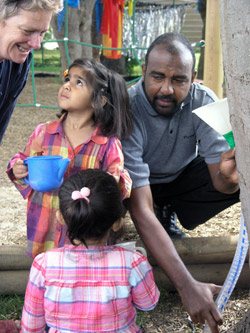
Since it was founded in 2011, the Bristol Early Years Teaching Consortium (BEYTC) has gone from strength to strength and is now renowned as a research base with 21 Specialist Leaders in Education (SLEs) working in partnership with Bristol City Council to provide support in a range of specialist areas to schools and early years settings across the city.
The consortium now includes Redcliffe and St Paul’s Nursery Schools and Children’s Centres, both integrated settings that are rated Outstanding and were two of the first nurseries in the country to be awarded National Teaching School (NTS) status.
Collectively, the two schools offer more than 45 continuing professional development (CPD) courses, including a range of bespoke research and study days, short courses, higher education programmes at master’s level, and initial teacher training in collaboration with both the University of Gloucestershire and Bath Spa University.
‘It has been incredibly exciting,’ says Lucy Driver, executive head of St Paul’s and National Leader of Education. ‘It has at last put early years right at the heart of the whole of the local authority cross-phase agenda.’
SPECIAL RELATIONSHIPS
‘What’s innovative and different,’ she adds, ‘is the way we work in collaboration with the local authority. Together we’ve developed a model of intelligence sharing and quality improvement that we are now sharing with primary and secondary teaching schools.’
Ms Driver explains the BEYTC meets with the local authority on a regular basis to analyse achievement data, outcomes from Ofsted inspections and quality improvement visits and identify settings that need additional support. The local authority then commissions the consortium’s team of SLEs to assist in high-priority areas. These SLEs specialise in eight key areas: assessment and transition; communication, language and literacy; family support; birth to threes; early maths; outdoor provision; special educational needs; and equalities.
 ‘They have now become key systems leaders in our sector, providing intensive school-to-school support, developing CPD, building capacity, developing partnerships and working on research in their specialist subject areas,’ says Ms Driver.
‘They have now become key systems leaders in our sector, providing intensive school-to-school support, developing CPD, building capacity, developing partnerships and working on research in their specialist subject areas,’ says Ms Driver.
‘They are focused on narrowing and filling the gaps in achievement and provision and are making a really big difference. It feels like we are changing the whole system from within and growing new aspirant SLEs to ensure its sustainability.’
The BEYTC’s team of SLEs have been forming partnerships with those in primary and secondary schools to develop support programmes for children throughout their school careers. What’s more, St Paul’s, which historically ran an early years programme for newly qualified teachers (NQTs), is now leading on the development of joint early years, primary and secondary NQT training.
‘To have secondary SLEs jointly facilitating a programme with nursery SLEs has felt very powerful,’ says Ms Driver. ‘It feels for the first time that we are supporting the child’s whole learning journey from birth to 19. The shared intelligence between the SLEs has been transformational. I don’t think colleagues had recognised the expertise in teaching and learning in the early years sector or the brilliance of our youngest learners.’
INTENSIVE FAMILY SUPPORT
Ms Driver says family support was not recognised as a specialist area until the BEYTC created its own and persuaded the National College for Teaching and Leadership to acknowledge it.
‘We’re the first, if not the only, teaching school to have family support SLEs, and this includes some that are not from teaching backgrounds. Most of our nursery schools in Bristol have integrated children’s centres and, as a response to the Pupil Premium, many more primary schools have identified the need for some sort of family support role. Consequently, we identified the need for really strong leaders in this area to support other settings to strengthen this work.
‘Our local primary and federation teaching schools have appointed SLEs in early years but are not managing to deploy them or support their specific developmental needs so they have been requesting to join our SLE group. Our family-support SLEs now provide intensive support, lead on training and run networks for newly appointed leads. They’ve been trialling and modifying family support improvement guidance and co-delivering qualifications like the Level 2 Working with Families.’
RESEARCH: DRIVING THE VISION

Elizabeth Carruthers, National Leader of Education and executive head of Redcliffe, says the BEYTC has put research at the centre of its aim to improve early years practice in Bristol. ‘Research is the vehicle that drives our vision, which is also about empowering people to own their learning,’ she explains.
‘Many teaching schools have abandoned the research element, whereas we see this as the underpinning strand to grow and innovate. Teaching schools are about a self-improving system in which research must be the major part. It is hard though, and you need somebody to constantly fly the flag – that is my job. I am presently midway through my PhD and I’m passionate about teachers and early years practitioners as researchers.’
 The consortium has a well-established research base with all teaching staff engaged in either settings-based, postgraduate or national research projects spanning each of their eight specialist fields.
The consortium has a well-established research base with all teaching staff engaged in either settings-based, postgraduate or national research projects spanning each of their eight specialist fields.
The SLEs have set up ‘research hubs’ around each area of specialism on the BEYTC website, where their research is disseminated along with related articles, reports and academic papers.
‘The model of CPD has moved dramatically away from a static one- or two-day course to research and enquiry,’ says Ms Carruthers. ‘SLEs are now developing skills in analysis and research methodologies and, instead of delivering a training session to early years practitioners, they are collaborating with them on interesting and exciting projects that have no definite end. Playgroups, childminders, small private settings and foundation classes in schools are engaged in small research projects and asking their own questions, supported by the SLEs.
‘We are fortunate to have a strong partnership with the local authority, which also understands the importance of research in a self-improving system. The Bristol Early Years Maths strategy is rooted in research, and at its base are four SLEs who all took a double maths master’s module. Thinking and reflecting together over the 18 months of the module gave them a shared understanding of young children and mathematics.
‘From this, two SLEs rolled put professional development in the form of a three-morning course with a research element. This reached over 150 maths leaders across the pre-school sector. The pre-schools were especially hungry for this opportunity and so receptive to the possibilities of leading maths in their setting. There is a real dearth of opportunities in maths CPD across the country for pre-school groups.’
Ms Carruthers explains a similar course was then developed for reception teachers, helping build up capacity and understanding about children’s mathematics across the early years phase. ‘This work has established a network of maths leaders, and the SLEs are pivotal in sustaining the interest and further development of this group,’ she says. ‘From these leaders, the research projects are continuing to grow.
‘The BEYTC has created a culture of research and enquiry but this has taken time and negotiation and keeping the focus. We are building intellectual capacity that is innovating and creating new ways of thinking about early education.’
Redcliffe is about to launch a four-day course entitled Establishing a Research Lead Within Your Early Years Setting, something that Ms Carruthers believes may build even more capacity in research and enquiry across the sector.
‘Redcliffe itself has a strong research culture built up over time and our specialist expertise in outdoor learning, food, maths play and research has developed from researching and writing in these areas,’ she says. ‘I think that we have gone beyond the superficial and really deepened our practice and, importantly, our thinking in these areas especially.
‘It is hard to find the time and space for reflection,’ adds Ms Carruthers. ‘But once the thinking has begun, it really takes off. We have truly embraced research but we still have to think how we can sustain the momentum.’
Both head teachers believe the BEYTC’s success is due to the shared vision and professional trust they have built up together over the past few years.
‘It’s about altruism and professional generosity and always keeping in mind the bigger picture and all our children in Bristol and our entire sector,’ says Ms Driver. ‘It’s taken time to grow trust and that professional generosity, and it’s a really successful working relationship now.’
‘I think we also need to flag up the importance of the strong early years tradition in Bristol,’ adds Ms Carruthers. ‘The playgroup movement began in Bristol and it has 12 strong nursery schools, and the children’s centres are still under the local authority and have not been sold out. This has made fertile ground to build our consortium. It is a collaboration and, although Redcliffe and St Paul’s are the lead nursery schools, everybody is contributing.’
MORE INFORMATION
Bristol Early Years Teaching Consortium, www.bristolearlyyearsresearch.org.uk
Redcliffe Children’s Centre & Nursery, www.redcliffechildrenscentre.co.uk
St Paul’s Nursery School & Children’s Centre, www.stpaulschildrenscentre.co.uk
Teaching Schools Council, http://tscouncil.org.uk
How to get involved in the NTS programme, www.gov.uk/government/collections/teaching-schools-and-system-leadership-how-you-can-get-involved
[asset_library_tag 1112,Download the PDF]









